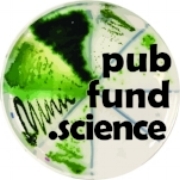Algae are a versatile, customizable, and sun-powered biotechnology platform useable a variety useful tasks.
Read MoreGovernment Shutdown /
When our government can't even keep its doors open, how are we supposed to be able to rely on it for planning of things like research initiatives? With the government lurching from crisis to crisis, unable to come up with an acceptable budget, who knows what long-term effects this will have on US scientists.
Read MoreUnder the Lab Coat I: Science Fiction /
One of the goals of this process is to get more people familiar with scientists. To do that, I have to talk about myself on social media, which is something I don’t do often (and kind of hate). I’ve mostly ignored social media for the past few years, and realize now that that’s part of the problem. If scientists aren’t engaging, sharing their opinions, or talking about their work, people won’t be able to understand them. Facts and figures aren’t enough to change hearts and minds: only stories can do that. People need to see scientists as people with stories to tell. So, every Friday I’m going to post something about what it’s like to be a scientist, something personal about how I got to where I am (soliciting the Internet for science funding), or just talk about things I’m interested in. I’m titling this series ‘Under the Lab Coat’. Today I’m going to talk about science fiction, and how it helped me get where I am today. So. Deep breath. Here goes:
I think my decision to go to grad school can probably ultimately be blamed on science fiction. I read a lot of science fiction when I was growing up. Sci-fi authors seemed like the only people who actually think about things in the long-term. I think that’s what I loved about the best sci-fi stories: they can show us the pitfalls ahead of us. Then it’s up to us to decide how to avoid those traps in the future we create.
Lately though, it seems like we've wandered off the path that leads us to the more positive futures, like those featured in the universe of Star Trek. In Star Trek, where war on Earth has ended, science is valued, and respect and tolerance are practiced regularly. Up until last year, it seemed like we were heading in that direction. Now, that ideal future seems further away than ever.
It seems like we've taken a fork in the road that leads down another path; the path to a dystopian science fiction future. This path looks a lot less like Star Trek, and a lot more like A Canticle for Leibowitz, by Walter M. Miller Jr. For those of you unfamiliar with the book, it's a Sci-Fi classic that charts the slow recovery of civilization from a society-ending nuclear war. One of the common themes is a backlash against Science, literacy, and education. I'm worried that we're heading in that direction. More and more people, across the political aisle, seem to distrust the conclusions of science. Anti-vaccination activism, disbelief in evolution, GMO safety, global warming denial, the current idiotic Silicon Valley trend of 'raw water' - these are all signals that science isn't valued, isn't prioritized. If I've learned one lesson from all my reading of science fiction, it's that societies that don't place a high value on science can only go backwards.
Ultimately, that's what this non-profit has become for me. I want to get us off the path we're on, and this is the best way I can think of to try to nudge us back in the right direction. The consequences are too dire to do nothing.
So, help us get out of the Darkest Timeline, and support Public Funding of Science by donating today!
Why Mars? /
The reason to go to Mars isn’t Mars; it’s Earth. Mars is like Earth minus the benefits of our home planet’s biosphere. To survive on Mars, we’re going to have to excel at sustainability. We’ll have to treat our waste as an invaluable resource, rather than a bi-product to be pumped into our local waterways. We’ll have to find ways to live and manufacture things like plastics without the benefit of fossil fuels, in a high CO2 atmosphere. In other words, the science we’ll have to do, and the subsequent technologies we’ll develop to survive Mars will also let us live more sustainably on Earth.
Read MoreCampaign is up and running! /
Winning the Internet…for Science!
Twitter followers: 0
Facebook page followers: 5
The purpose of this blog is to support our first non-profit campaign, where anyone in the public can help fund scientific research. We're running our campaign through Crowdrise, with the goal of funding a pilot project for $30,000. Click here to donate now!
I started this project a little over a year ago, as part of an application for the Roddenberry Prize for future innovation. I didn’t win, but shortly after I filed the non-profit paperwork, the 2016 election happened. Suddenly it wasn’t business as usual for science anymore, and I knew that this non-profit was the best way for me to join the fight against fake news and misinformation. You don’t fight a false narrative by spouting facts and figures about how their news is incorrect (the natural default when arguing in science). Facts and data aren’t going to win people over if they don’t believe in you. The best way to win someone over is to tell a compelling story.
This blog is going to be an attempt to tell the story of a scientist (me), but also the story of some really important science, and an effort to put it into context. I think we need to hear more than just facts from scientists; we need to hear their opinions, thoughts, and dreams. So please, Explore our site, like us on Facebook, follow us on Twitter, or sign up for our newsletter.
And of course, please Donate!

